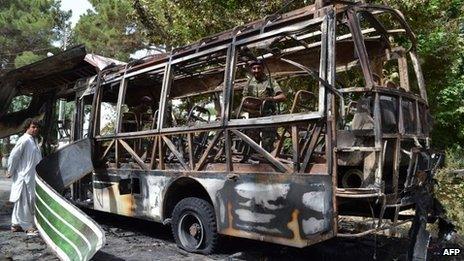Quetta university shut after attacks
- Published

The women's university at the centre of Saturday's deadly twin attacks in the Pakistani city of Quetta has been shut down until further notice.
In the first incident a bomb on a university bus killed 14 women. Gunmen then killed 11 when they laid siege to the hospital treating the wounded.
Sardar Bahadur Khan University is the only all-female university in troubled Balochistan province.
The move is seen as a safety precaution in a city which has seen many attacks.
The site of the five-hour gun battle that unfolded after the bus bombing, the sprawling Bolan Medical Complex in Quetta, has also been closed indefinitely.
An extremist Sunni group, Lashkar-e-Jhangvi, has said it carried out both attacks. A spokesperson for the group said a female suicide bomber had been used to target the university students.
Although police now say they have found the severed head of a woman from the scene, they say the investigation is continuing to see if this really was a suicide attack.
Correspondents say that the use of women as suicide bombers in Pakistan has been rare.
On Sunday, Quetta observed an official day of mourning but Monday saw yet more groups, such as the Balochistan Bar Association, declare a strike to mourn the attacks.
Saturday's bloodshed began when a bomb exploded on a bus carrying students at Sardar Bahadur Khan Women's University.
When survivors were brought to the medical centre, militants stormed the building and started shooting indiscriminately.
The battle between the militants and security forces left nurses, security personnel and a senior city official among the dead.
Four attackers were also killed and one arrested, officials say.
Quetta, a city of 900,000 people in the south-west of the country, has long been troubled by violence mainly targeting the Shia Muslim minority, often claimed by groups such as Laskar-e-Jhangvi.
In January at least 81 people, mainly Shia Muslims, were killed in a bomb attack on a snooker hall in the city. And in February almost 90 died when a bomb ripped through a marketplace in a Hazara Shia part of the city.
- Published12 January 2013
- Published15 June 2013
- Published15 June 2013
- Published17 February 2013
- Published15 March